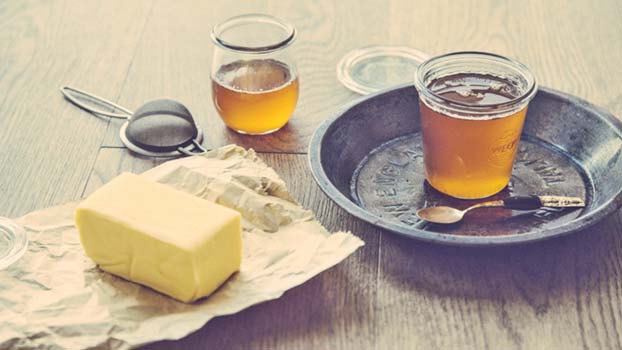What’s better: ghee or butter!

What is that one thing that can simply decide the fate of any delicacy? Well, it is the addition of that age-old aromatic ingredient - Ghee and butter. There’s no denying to the fact that the mere addition of a spoonful of ghee or butter can take the taste of your delight up a notch. Right from accentuating the taste and texture of the dish to giving it a nice aromatic touch, imagining a hearty meal without these forms of milk fat is next to impossible.
Interestingly, both ghee and butter are churned out milk but the taste and usage is way different. One is the soul of traditional gravies and curries, whereas the other adds on to glory of several western-delicacies. Since ages, we have relished these delights in our own unique way. Despite how differently delicious they taste, there are a lot of similarities as well as differences between the two. Read on to know more about what makes the two different from each other.
Right from accentuating the taste of sweet dishes to giving that excellent aroma to curries and gravies to biryanis, ghee can simply accentuate the taste of any delight it is added to! Since ages, ghee has been used as an active ingredient in Ayurvedic medicines as known for its amazing medicinal properties and health benefits. Both Ghee and butter are made using cow's milk.
Ghee is a form of refined clarified butter and is made by melting the regular butter. In fact, butter separates into liquid fats and milk solids. Once separated, the milk solids are removed, which means that ghee has less lactose than butter. As mentioned above, butter is also made using cow's milk and is churned out of fresh or fermented cream or milk to separate the butterfat from the buttermilk. High on dairy fat, butter is a great source of milk protein and is great for a high fat diet.
Though these culinary twins can simply add soul to any delight, but their differences actually make them perfect for various cuisines. Interestingly, both ghee and butter are churned out of cow's milk, but their nutritional profiles and fat content are very similar. However, ghee is better for people suffering from lactose intolerance as it has slightly low-protein levels as compared to butter, which makes it a better choice for people suffering from lactose intolerance.
On the other hand, butter is great for someone banking on a high-protein diet, it has high levels of dairy fat, casein and lactose than regular butter.
The presence of a fatty acid known as butyrate acid in ghee helps in defining the digestive health. This component is often produced by bacterial fermentation of fiber in the colon, a person does not need to consume saturated fat to obtain this and this works has great anti-inflammatory properties. On the other hand, butter is high on fats and is risky for patients suffering from high cholesterol if not consumed in moderation.
In a nutshell, it can be concluded that both ghee and butter are derived from cow’s milk, but their striking differences make them distinct! However, ghee is much more healthier than butter and is great for people suffering from lactose and casein intolerance as it is low on both the components. In fact, a little addition of ghee or butter to daily diet is not harmful, but keeping a check on the portion is the way to maintain a healthy weight.



